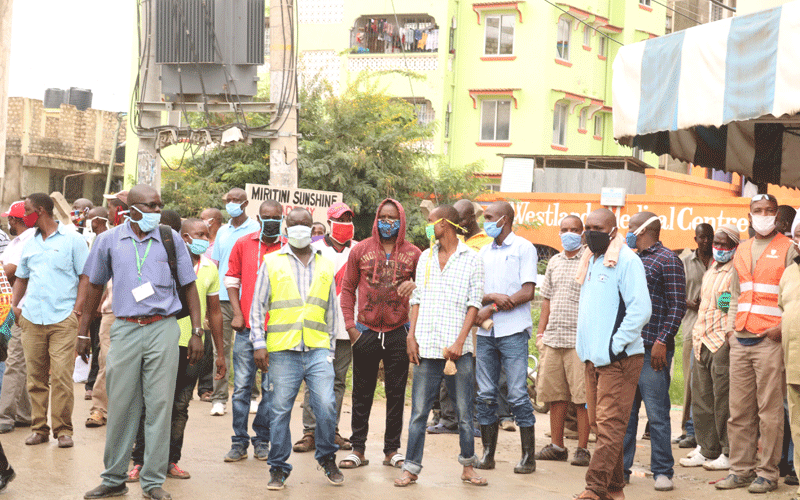Truck drivers recount Corona stigma, harassment in Uganda

Reuben Mwambingu @reubenmwambingu
Peter Njaramba Ngiciri, a 57-year-old Kenyan truck driver working with a Mombasa-based transportation and logistics company, says he has had a bitter experience in his recent trips to Uganda and back.
Brazen stigmatisation coupled with humiliation and harassment is what they have to endure as they cross borders for business.
He recalls how he, alongside other colleagues, have been branded “Covid-19 spreaders” while in Uganda.
“In Uganda they call us Corona. Once you enter the Ugandan border you encounter a really hostile situation.
In fact, they rarely talk to us,” said Ngiciri who returned from Uganda on Saturday.
The father of five says things have changed since the virus struck the country. He says they are forced to cook for themselves because Ugandans decline to serve them at eateries.
As a result they carry along their foodstuff and cookery equipment to cook along the way.
“Once you enter Uganda you just have to be prepared for the worst. You will encounter a hostile reception. So we have resolved to cook for ourselves to be safe,” he says.
Hostile reception
Before the Covid-19 outbreak, he says they could move around freely in other Ugandan towns but in recent days they have been designated one stopover near the Tororo-Mbale junction where they are supposed to offload their cargo.
“Once we arrive, they alert one another that ‘coronavirus has arrived’, they abuse us even after we show them our test certificates.
At first we used to be shocked by this kind of reception but we have now got used to it even though it hurts,”says Ngiciri.
Another unit driver, who did not wish to be named, says the stigma of Kenyan drivers is so high such that even when they want to purchase something in Uganda, they are forced to use non-verbal signs .
Such is the state of stigma that Kenyan drivers have reportedly been undergoing recently while in the neighbouring countries because of Covid-19.
Kenya Truck Drivers Association chairman Roman Waema says the association has received reports of Kenyan drivers being pelted with stones in Uganda.
He says hundreds of Kenyan drivers have been stranded at various East African border points where they have been enduring “all sorts of harassments.”
“The situation is not only in Uganda but also in other border areas like Tanzania, Rwanda and Sudan.
In Elegu border between Uganda and Sudan authorities have a list of three Kenyan drivers they are looking for who they accuse of being notorious in spreading the virus…
Right now as we speak, over 100 drivers are at Kagitumba border between Rwanda and Uganda where they have been stranded for eight days,” he said, adding: “Other 30 drivers are at Rusumu, between Tanzania and Rwanda where they have been stuck for 17 days.”
Northern Corridor Transit and Transport Coordination Authority (NCTTCA) executive secretary Omae Nyarandi says since the onset of Covid-19 crisis in the region, stigmatisation of truck drivers has been high not only in foreign countries but also within Kenyan borders.
As a result he said a campaign is needed by member states to bring to an end the stigma which he said is jeopardising the trade in the region.
According to Nyarandi, The Northern Corridor region is bracing for tougher times due to the ripple effects that are expected to reverberate through the various economic sectors as well as the supply chains in the predictable future.
“The corridor routes transverse major cities and urban areas some of which have been marked as Covid-19 hotspots, making the logistics sector inevitably vulnerable to the pandemic as well as a possible vector for the transmission of the virus in the region,”he said.
“Already drivers are experiencing long stay at border points as they await clearance with long queues of trucks reported at the Malaba border,” he said.
Nyarandi said the performance on transit time on Mombasa-Busia route worsened from 90 hours to 227 hours and further to 276 hours for January, February and March, respectively.
He said harmonisation of Covid-19 test certificates and making them acceptable across the member states will form solutions to part of the challenges.












